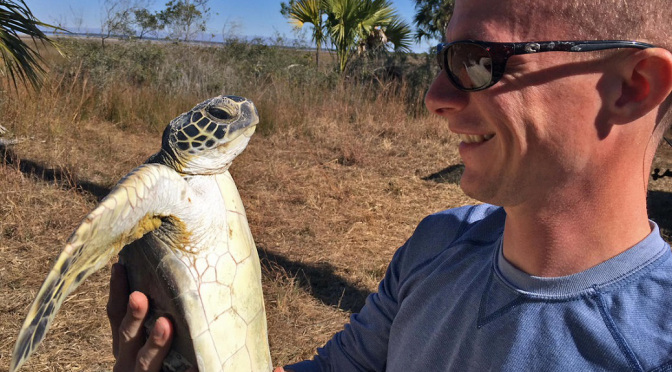Sea Turtles Stunned By Cold Weather Rescue In Florida
By Wes Annac, Editor, Openhearted Rebel, guest to Natural Blaze
You might have heard that this winter, temperatures in Florida have been so low that iguanas have fallen out of trees, seemingly frozen. But did you know the cold weather has affected other animals in the state?
The low temperatures have particularly hurt sea turtles, “freezing” them to the point that they can’t swim or move. Fortunately, rescuers have saved, treated, and released roughly 1,000 affected turtles, helping them in a time when the cold would’ve killed them.
“Second-Largest Mass Cold-Stunning Event”
The United States Geological Survey reports that “volunteers and wildlife experts” in St. Joseph Bay, Florida have saved around 1,000 sea turtles stunned by the state’s recent cold weather. Margaret Lamont, a Geological Survey research biologist, has called this the “second-largest mass cold-stunning event of the 21st century”. (1)
The largest, which we’ll learn about later, was in 2010.
Widget not in any sidebars
The USGS reports that Lamont, along with the Florida Fish and Wildlife Conservation Commission, is “coordinating” the effort. Around 50 people are helping, including Florida Coastal Conservancy volunteers, U.S. Fish and Wildlife Service employees, people from Eglin Air Force Base, Florida FWCC employees, employees of Gulf World Marine Park, and two other scientists with the USGS. (1)
They managed to save around 700 turtles from January 2-7 and around 300 from January 17-19. (1)
Photos from the Rescue
Here are some photos from the rescue that the USGS shared:



Burn belly fat by avoiding this one food (Ad)

The cold weather threatened the following turtle species:
- Green turtles (also known as Chelonia mydas)
- Kemp’s ridleys (also known as Lepidochelys kempii)
- Loggerheads (also known as Caretta caretta)
- One “endangered hawksbill” (also known as Eretmochelys imbricata) (1)
As you can imagine, space for all these turtles was limited. Lamont tells us that rescuers usually take them to Gulf World where they can “rest and recover”, but the center filled up and could only take animals that were injured. Lamont resorted to treating turtles in a house she’d rented for research, which was “full of turtles, inside and outside, on Friday, Jan. 19.” (1)
News Outlets Predicted Cold-Stunning
The weather was predicted to stun sea turtles, with this January 3rd article from Jim Waymer at Florida Today explaining how it could happen. Jim warned that “colder water temperatures expected toward the end of this week could ‘stun’ sea turtles and stress manatees — some fatally — in the Indian River Lagoon and other coastal waters, wildlife advocates worry”. (2)
The problem for sea turtles, Jim writes, is that their body temperature relies on “external sources of heat”. When the shallow water gets too cold, they can die if they’re unable to swim to a deeper, warmer spot. Although the turtles swim to southern waters toward the end of October, some depart too late. The ones that remain in shallow water have the most to worry about, as the temperature drops faster there. (2)
Lamont “Very Proud” of Volunteers
According to the USGS, Lamont is glad she and her fellow volunteers were able to save so many turtles. She’s “very proud” of the people who’ve united to help them, and she says she’s “especially proud of the volunteers who are out here in the cold and mud, doing exhausting work for no reward and often no recognition”. (1)
She’s been inspired to see everyone work so hard, stating:
“…People are out there in the cold and mud, with harnesses around their chests, pulling the kayaks across the mud flats… It’s exhausting. It’s really tough. And it’s really inspiring to see that people are willing to do it to save these animals.” (1)
The temperature dropping below 50 degrees is hazardous to cold-blooded sea turtles, the USGS reports. Their metabolism slows to the point that they can’t swim or go to the surface for air. This can cause them to drown. Although they usually retreat into deeper water when it gets cold, if the weather is bad enough, even deep water will drop below 50. (1)
 Free – 15-in-1 Survival Kit (Ad)
Free – 15-in-1 Survival Kit (Ad)
The Record-Setting 2010 Cold Snap
Volunteers usually have to rescue around 30 to 40 sea turtles a year that are stunned by the cold, the USGS reports, and the biggest rescue in the past hundred years took place in 2010. During this time, the cold stunned around 1,700 turtles. According to Lamont, low temperatures at night combined with high tides that bring turtles back to shallow water were partly responsible. (1)
As you can see, cold weather in Florida is problematic for sea turtles. Fortunately, as we’ve learned, people are stepping up to help.
Jim at Florida Today writes that the Brevard Zoo teamed up with the Sea Turtle Preservation Society to open a “Sea Turtle Healing Center” at the cost of $150,000. They opened the center to solve the problem posed by the long distances between different rehabilitation facilities, as one was over 100 miles away from where “hundreds of cold-stunned turtles” were stuck. (2)
Other Creatures Impacted by the Cold
As you can probably imagine, the cold weather in 2010 impacted far more creatures than the sea turtle. Other creatures affected, Jim writes, include:
- Manatees
- Various species of fish
- Pelicans
- Gulls
- Terns
- Infant raccoons
- And more(2)
Many animals were treated at the Florida Wildlife Hospital and Sanctuary in Palm Shores. (2)
Turtles Scooped to Safety
As far as the sea turtles go, in many cases, they were scooped to safety.
The USGS reports that their scientists, as well as scientists from the USFWS and Florida FWCC, would go out to the affected areas on boats and “scoop cold-stunned turtles out of the bay”. They would also go on foot, with some wildlife workers, scientists, and volunteers walking beaches and marshes to find turtles on the shore and place them in kayaks. The kayaks can weigh “400 pounds or more” when filled with stunned turtles, and access points are two to three miles away. (1)

According to Lamont, rescuers weigh the turtles, measure them, mark them, and examine them to see if they need medical attention. If not, they give the turtles some time in sunlight or “another warm space” before eventually releasing them. They expected the rescues to end on the night of Friday, January 19 due to the return of warm weather, and they planned to release most turtles from the Gulf World Marine Park the following Saturday. (1)
Manatees’ Fate Still Unknown
While the sea turtles had a happy ending, we might not be able to say the same for the manatees.
Referring back to the low temperatures in 2010, Jim at Florida Today writes that on Jan. 20, after temperatures in the state had gone down to 15-20 degrees, 17 manatees died from stress caused by the cold. Rescuers managed to save 58 of them in the following months, but sadly, that year they discovered a record of 503 that had died. (2)
Regarding the cold weather this year, Jim writes that officials from the FWC stated it could be “weeks” before manatees show signs of being hurt. Michelle Kerr, a spokeswoman for the FWC, said: “it does take more prolonged exposure for manatees”. (2)
Basically, we’ll know in the next few weeks if the low temperatures affected any manatees to the point that they’ll require help. If the rescue effort for them is anything like it was for the turtles, then they should be in good hands.
People Care
We should commend the volunteers who gave their time and energy to rescuing these turtles from a tragic death. It’s sad when any environmental factor creates the need to rescue hundreds or thousands of animals, but the response shows that not all humans ignore other creatures’ suffering. There are people who care, and unlike the majority, they choose to do something positive.
Thanks to the volunteers, 1,000 sea turtles will return to warm waters. The world would be a far better place if we were all this empathetic and willing to help when someone or something is in need.
Fix your vision naturally without glasses (Ad)
Sources:
(1) “Scientists [and] volunteers rescue about 1,000 cold-stunned sea turtles”, United States Geological Survey, January 19, 2018 – https://www.usgs.gov/news/scientists-volunteers-rescue-about-1000-cold-stunned-sea-turtles
(2) Jim Waymer, “Cold could kill sea turtles, manatees and other marine life”, Florida Today, January 3, 2018 – https://www.floridatoday.com/story/news/local/environment/lagoon/2018/01/03/cold-could-inflict-deadly-chilling-effect-sea-turtles-other-marine-life/999199001/
About the author:
 I’m a twenty-something writer & blogger with an interest in spirituality, revolution, music and the transformative creative force known as love. I runOpenhearted Rebel, a daily news blog dedicated to igniting a revolution of love by raising social and spiritual awareness.
I’m a twenty-something writer & blogger with an interest in spirituality, revolution, music and the transformative creative force known as love. I runOpenhearted Rebel, a daily news blog dedicated to igniting a revolution of love by raising social and spiritual awareness.
I also have a personal blog in which I share writings related to spiritual philosophy, creativity, heart consciousness and revolution (among other topics).
I write from the heart and try to share informative and enlightening reading material with the rest of the conscious community. When I’m not writing or exploring nature, I’m usually making music.
Follow me on Facebook (Wes Annac,https://www.facebook.com/openheartedrebel) and Twitter (Wes Annac, https://twitter.com/love_rebellion)
If you enjoyed this post and want to support my work, consider sending a contribution via PayPal to wesremal@yahoo.com.
Recent articles and videos:
- It’s All Within
- This Reggae Song Reminds Us to Love Life
- Why You Should Care About the Meat Industry
- Laughter in an Insane World
- Embrace the Shadow Self: Your Dark Side Misses You
- Awakening in Action
- Video: How Does Marijuana Help the Body?
- 8 Interesting and Strange Unexplained Mysteries – Part 1/3 (Weekly Awareness Guide)
- Art Is a Bridge (Meditative Writing)
- 5 Facts About the World’s First “Forest City”
- Are Ghosts “Earthbound Spirits”?
- Solar Paint: An Innovation in Alternative Energy
No copyright. Share freely with attribution to Wes Annac andOpenhearted Rebel.
Thanks for reading!







